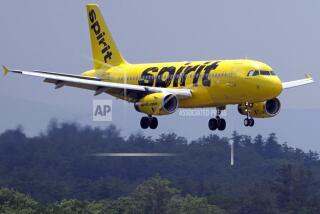United Set to Halt Deal for US Airways
- Share via
United Airlines plans as early as today to call off its $4-billion acquisition of US Airways, a United executive said Sunday.
The decision to pull out of the acquisition proposal came after the airlines had repeated problems satisfying Justice Department antitrust concerns over the complex deal, said the United executive, who requested anonymity.
“We still believe the merger was the right course for us,” the executive said. “But we can’t satisfy the Department of Justice concerns. So we decided to abandon the transaction.” The executive said it was unlikely United would return to acquire US Airways even with a lower bid, “unless there was a change in the regulatory environment.”
US Airways declined to comment on United’s expected move. But an executive familiar with US Airways said United’s decision left the airline “disappointed.”
Under the deal, United also would have taken on about $7 billion in debt.
The decision by Chicago-based UAL Corp., United’s parent, to abandon the biggest merger proposal in U.S. aviation history raises questions about the future of Arlington, Va.-based US Airways Group Inc. and its 46,000 employees. US Airways Chairman Stephen M. Wolf has maintained that the airline cannot survive as a stand-alone carrier against larger operations, such as United or AMR Corp.’s American Airlines, or smaller, low-cost carriers such as Southwest Airlines Co.
The deal’s termination also would nullify the creation of DC Air, the airline that was to be headed by Black Entertainment Television founder Robert L. Johnson. United, the nation’s second-largest airline, proposed creating DC Air to answer antitrust regulators’ concerns that a combined United-US Airways would be too dominant on the East Coast. DC Air would have been the largest airline owned by a minority. Johnson declined to comment on the latest development.
If US Airways, the nation’s sixth-largest airline, can’t find another partner, Wolf has said the airline could end up filing for Chapter 11 bankruptcy protection. Last year, US Airways reported a loss of $269 million and revenue of $9.27 billion. In the first quarter this year, US Airways reported a loss of $178 million on revenue of $2.24 billion.
Some industry analysts, airline union leaders and other airline executives have said US Airways could improve financially and remain independent by controlling its costs, eliminating unprofitable routes and generally tending to the business of running the airline.
“It is very unlikely Wolf will be there three years from now,” said Darryl Jenkins, head of George Washington University’s Aviation Institute. “I doubt they’ll go into bankruptcy any time soon, but they’re going to have to do some real serious reorganization.”
While the airline’s executives have focused on completing the proposed acquisition, competitors such as Delta Air Lines Inc. and low-fare carriers including Southwest, AirTran Airways and JetBlue Airways have increased operations in US Airways’ Northeast route system.
Jenkins said US Airways has the highest operating costs in the industry, so it is unlikely another airline would be interested in acquiring it in its entirety.
US Airways’ value is higher if it “sold components off rather than being sold as a complete entity,” Jenkins said.
However, US Airways executives have said that selling off its most profitable components would make it more difficult for the airline to restructure itself into a profitable operation.
Under terms of its agreement, United has to pay US Airways $50 million if it pulls out of the deal. US Airways senior management, including Wolf, still would receive a total of almost $20 million in supplemental benefits and vesting stock options for having set up a deal.
Wall Street is expected to applaud United’s move. Airline analysts have said United’s offer of $60 a share was too much, especially now that the economy is much weaker than a year ago.
United chose to call off the agreement now instead of waiting until after Aug. 1, the deal’s deadline, so United executives could focus immediately on improving operations, the executive said. Since United announced the deal in May 2000, shares of UAL have fallen 41%, closing Friday at $35.15 a share on the New York Stock Exchange. Shares of US Airways have fallen 7.6% since the deal was announced, closing Friday at $24.30 a share on the NYSE.
United, which last year reported a profit of $50 million and revenue of $19.3 billion, has had a rough start financially this year. The parent company reported a first-quarter loss of $305 million and revenue of $4.42 billion.
The company also expects a loss in its second fiscal quarter as the number of travelers decline and fuel costs rise. The airline, with operations that were severely affected last summer by contentious negotiations with its pilots union, is now in talks with leaders of its machinists union.
More to Read
Inside the business of entertainment
The Wide Shot brings you news, analysis and insights on everything from streaming wars to production — and what it all means for the future.
You may occasionally receive promotional content from the Los Angeles Times.










